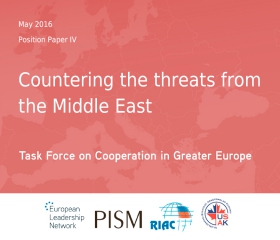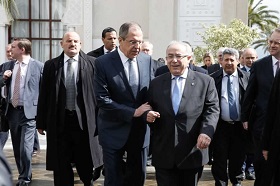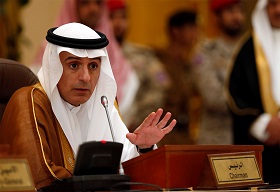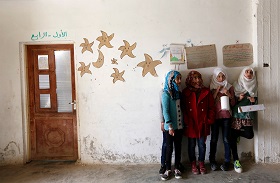Algeria: Russia’s Crisis-Proof Partner in the Arab World
(votes: 1, rating: 5) |
(1 vote) |
Senior Analyst of the Centre for Crisis Society Studies, Expert of the Middle East Institute, RIAC
Algeria is a rare Arab country still unhurt by the surrounding disruptions and capable of an independent foreign policy. Although in 2014-2015 its economy worsened due to the visible drop in hydrocarbons prices and a slump in domestic gas production, the situation in Algeria is fairly tranquil. The country is important for Russia because it remains a major partner in military-technical cooperation and is independent internationally as far as the acute crisis in the Arab world is concerned, primarily in view of the disasters in Yemen, Libya and Syria.
Algeria is a rare Arab country still unhurt by the surrounding disruptions and capable of an independent foreign policy. Although in 2014-2015 its economy worsened due to the visible drop in hydrocarbons prices and a slump in domestic gas production, the situation in Algeria is fairly tranquil.
The country is important for Russia because it remains a major partner in military-technical cooperation and is independent internationally as far as the acute crisis in the Arab world is concerned, primarily in view of the disasters in Yemen, Libya and Syria.
Generally speaking, Algiers is striving to preserve the so far surviving states of the Greater Middle East in the existing borders and to stabilize the environment, since its deterioration will threaten Algeria, which is something Russia is also trying to achieve.
Yemen
In actuality, Algeria’s stance runs counter to the plans of Qatar, Saudi Arabia and certain Western states. For instance, in 2015 the Algerian government effectively disrupted Riyadh’s schemes to send a “joint Sunni army” to Yemen to fight against the pro-Iranian Houthis.
By doing so Algeria obviously sided with Iran, because it refused even to formally support the Saudi move under the pretext that its constitution offers no permission to use the national military forces abroad. At that, Riyadh eagerly counted on Algiers’s assistance, among other things on its military transport aviation that could be of great help for the Saudi operation in Yemen.
Algiers is striving to preserve the so far surviving states of the Greater Middle East in the existing borders.
More importantly, as a result of the Algerian refusal, the Saudi exploits have lost the ideological content broadly defined as “the struggle of Islamic true believers against sectarians and conductors of the Iranian influence.”
Against this backdrop, Algeria took to demonstratively improving relations with Iran, Saudi’s main regional rival.
Consequently, the Algerian-Saudi dialogue went downhill so badly that Riyadh accused Algiers of “sponsoring terrorism” and of an inability to bring to a halt its financing.
To make things even worse, at the Arab League session last March, Algeria challenged Saudi Arabia again by refusing to vote to proclaim pro-Iranian Hezbollah a terrorist movement, even after a massive propaganda campaign in Arab and Israeli media had flooded the information space with materials insisting that in the 1990s, Iran and Hezbollah had supported the jihadists who were trying to subvert the Algerian secular regime.
However, the Saudi leaders still hope to engage the Algerians during a future Saudi King visit. But Algiers would hardly reverse its policy even if this event takes place.
Syria
Indeed, it was its specific approach to Syria that has driven Algiers to quarrel with Riyadh and move closer to Tehran: Algerians would like to simultaneously preserve the regional status quo and step up the competition with Syria and Saudi Arabia for clout in the Arab world. However, the secular regimes of Syria and Algeria currently seem to have reached a sort of stable political equilibrium.
In practice, Algiers is quite cautious in criticizing Bashar Assad for his actions against the opposition, and at the same time regularly torpedoes the attempts of Doha and Riyadh to condemn Damascus in the Arab League.
Algeria's attitude explicitly impeded Syria’s diplomatic isolation that had been hastily proclaimed by Western and Arab media back in 2011-2012).
Since the Arab League decisions are taken by a consensus, Algeria has saved Syria from numerous attacks, which has in its turn hampered the escalation of hostility on the part of Muslim and Western states.
Accordingly, this independent and balanced approach could not remain unnoticed by Russia and other countries trying to settle the Syria crisis.
Algeria Mediating between Russia, Syria and Turkey
Not by coincidence, since last winter Algeria has been mediating at secret Russia-Turkey and Turkey-Syria talks aimed to prevent the escalation of tensions in these relationships.
Notably as requested by Ankara, Algiers has opened a channel for negotiating with Russia, which happened after November 24, 2015 when the Turks shot down a Russian SU-24 bomber.
Algerian sources insist that the parties, first of all Turkey, feared a major military clash, and amidst their belligerent rhetoric began seeking opportunities to step away from the duel barrier with dignity. And Ankara appeared desperate to find a way to evade harsher confrontation during the the hard times the country is going through.
To a great extent, Algiers was chosen as a communication channel because of its international prestige and respect in the eyes of Russia, Turkey and Syria. Algeria seems to be the only Arab state maintaining relations with Bashar Assad at the pre-war level.
As far as Turkey is concerned, in the recent years Ankara and Algiers have become much friendlier both due to more trade and economic cooperation and the works of a powerful pro-Turkey faction in the Algerian government.
These are the Algerian Turks residing in Northern Africa since late Middle Ages who now occupy important and frequently leading positions in ruling clans.
The secular regimes of Syria and Algeria currently seem to have reached a sort of stable political equilibrium.
The secret contacts have been running through relevant embassies in Ankara and Damascus. According to Algerian sources, the country has already been quite effective in peacemaking, since the dialogue has effectively hindered further escalation.
Moreover, by March 2016 the efforts elevated the episodic consultations to a palpable level and created a relatively stable channel for communication between Turkey and Syria, who had been extremely hostile to each other and were about to plunge into a hot conflict.
In fact, the unofficial contacts are motivated by situational factors, as Algerian sources state that “the Turks and Syrians would like to exchange data on efforts of Syrian Kurds toward the establishment of an independent state”.
While the issue so far seems off the table, the sides believe that the scenario “is appearing more likely as a result of the ongoing process” after last March when the Syrian Kurds proclaimed autonomy in northern Syrian areas under their control, which has caused much anxiety both in Damascus and Ankara.
Turkish fears are hardly ungrounded, as the process is fuelling the Kurds that confront the Turkish government.
Quite logically, the Syrian problem was discussed by Sergey Lavrov and Walid al-Muallem, Russian and Syrian foreign ministers, during Mr. Lavrov’s visits to Algeria in February and March, as well as by Turkish top officials.
Algeria and the Libya Crisis
The role of Algeria also seems of paramount importance in view of Libya. Back in 2011, when Westerners and their regional allies unleashed a military intervention against Tripoli to topple Muammar Kaddafi, the Algerian leaders openly assisted the legitimate government.
The aid was impressive and varied from diplomatic support and open condemnation of the West and its allies as aggressors to supplying Mr. Kaddafi with weapons, ammunition and fuel, and even to a ban against NATO planes flying over Algerian territory and support to Tripoli with intelligence on enemy activities.
Consequently, although the West, primarily the United States and France, kept labeling Algeria as their “main counterterrorist ally in Northern Africa and Sahel” (because until recently Algiers had cooperated deeply with the U.S. African Command), its relations with Washington and Paris markedly worsened.
Both the Algerian public and government the Algerians would not like to become the next target for democratization.
It was hardly accidental because both the Algerian public and government clearly saw the role of the West in the demise of Libya and Syria and grew apprehensive about the next steps of the U.S. and European allies in the region.
Among other things, the Algerians would not like to become the next target for democratization because from time to time Washington, Brussels and Paris criticized their poor state of democracy and civil liberties.
The West traditionally has chastised Algiers for its poor treatment of the media and bloggers, the absence of cultural autonomy for the Berbers, inadequate observance of the constitution and the alleged need to amend some of its provisions to limit the number of presidential terms.
Another omen could be found in the abrupt drop of U.S. purchases of Algerian oil.
Besides, in recent years Algeria has become vulnerable to external criticism because of the refugees, because the country transformed from a supplier into a recipient of migrants from Sahel and Western Africa. Algiers is responding harshly only to draw the additional rebuke from the U.S.
Most of all the Algerian leaders were impressed by the criminal cases opened against some of their former top officials and related to a number of active political and security figures as if they were involved in crimes against the humanity during the suppression of radical Islamists in the 1990s, as well as in the death of French monks in Tibhirine.
Accordingly, previous misunderstandings on Libya do tell on Algiers’s relations with the West, especially with France. The French government is trying hard, although with little success, to win more of the Algerian market lost to China that in 2014 became Algeria’s main trading partner. And all that in spite of regular visits to Algeria of the French president, premier and defense minister, Prime Minister Manuel Valls being the most recent visitor, who have outpaced their counterparts in the number of trips but still failed to obtain a breakthrough)
The biggest problem is in the military-technical cooperation that is traditionally dominated by Moscow, except for surface ships, to some extent because Algerian leaders including Abdelaziz Bouteflika took part in the bloody Independence War of 1954-1962 and remember the French colonial times that began in 1830.
The 960-km-long Algeria-Libya border became a headache for the government that is still unable to plug the stream of contraband.
This legacy is effectively sustained by differences on Libya, especially by the French U-turn against Mr. Kaddafi with whom Paris had appeared perfectly friendly before 2011 and cooperated even in the security area. All these factors decidedly overshadow the future of the French-Algerian ties.
To make things worse, the Libyan problem is still on the agenda even in the absence of Muammar Kaddafi. After 2011, the 960-km-long Algeria-Libya border was penetrated by tons of weapons despite frequent interceptions by national security forces, and became a headache for the government that is still unable to plug the stream of contraband.
Notably, the Libya factor is getting increasingly meaningful in domestic politics. In August and September of 2015 arms traffic was a key reason for firing practically all top figures in the DRS, i.e. Departement du Rensuignement et de la Securite, including generals Hassan and Mohammed Mediene.
As a matter of fact, along with President Bouteflika and Chief of Staff Ahmed Gaid Salah, the latter was seen as a member of the unofficial ruling triumvirate.
Algeria's Libyan Front
Meanwhile, the continuing instability in Libya is causing Algeria increasing economic damage, not only because the government has to divert more and more resources to the Libyan border but because the country's strategic security is at stake.
Only in 2012-2013, the Libyan combatants inflicted Algeria two very sensitive blows. One was the kidnapping of border province Illizi? And the other involved the group of notorious field commander Mokhtar Belmokhtar, which attacked and badly damaged the Amenas gas facility. The killing of numerous foreign specialists provoked panic and the departure of many other foreigners who assisted in development and production of natural gas.
In fact, the attack has foiled the Algerian plans to reanimate the gas exports, so the country was unable to restore the production volumes until early 2015.
The Libya factor is getting increasingly meaningful in domestic politics.
With eastern challenges aggravating, Algiers received Western proposals to join the stabilization efforts in Libya. Since May 2014, French Defense Minister Jean-Yves Le Drian has been frequenting the Algerian capital in an attempt to get the country engaged in the American-French exploits.
Actually, Algeria was offered to restore order in the western part of Libya attached to the border, while Egypt was to deal with the eastern areas with the support of American and French aviation and special operations forces.
With the Libya challenges getting more menacing, at first glance the idea seemed tempting, especially as the de facto independent Berber enclave in western Libya is corrupting the Algerian Berbers who are getting more insistent about expanding their own autonomy.
If the Islamic radicals advance, the uncompromising Algerian government may as well become more active in Libya.
The U.S.-French proposals also appear attractive because in 2015 the Islamic State (IS) in Libya significantly grew in influence. Now the extremists boast up to 5,000 heavily armed and properly trained combatants, and back in July-August 2015 they placed videos declaring war on Algeria.
One could say that a plague is overtaking Algeria, although to a lesser extent. National security forces assess the Algerian IS groups at about 100 men but they still fail to neutralize them despite regular reports of success. In 2015, there were several painful attacks against local law enforcers, for example in the mountain areas of Kabilia.
One of the reasons lies in the permanent inroads from Libya but Algiers still rejects the U.S. and French proposals and opposes any sort of military intervention even with IS advancing, fearing becoming stuck in the Libyan swamp and not trusting Washington and Paris.
Instead, Algiers suggests focusing on creating conditions for a political dialogue and supporting the Libyan forces that have the trust of their population, challenge IS and truly unite the country.
However, this is not to say that Algeria totally rejects the idea of using any kind of force on Libyan territory. Bearing in mind a series of noticeable successes reached by the IS in late 2015 early 2016, Algiers has to respond in kind.
For example, the Algerian security services distantly support the anti-jihad forces with no direct involvement, always bearing in mind that the West can be hardly trusted. Besides, they have shut the transit of Moroccan and other foreign citizens who are known to supply the local IS groups. At the same time, the Algerian military command is building up intelligence sharing with Egypt, the indirect effect seen in the restoration of the Algerian embassy in Libya.
To this end, one cannot but mention Algeria's particular role in rebuilding a united Libya, which one may see in the support given to the new united Libyan government that as a result was able to move from Tunis to Tripoli in late March and early April.
The current wins provide Algiers with openings to grow into a more important mediator between greater powers.
One should consider along the same lines the statement of the Algerian Foreign Ministry on the rapid restoration of its embassy in Tripoli. (Algiers closed the embassy after the January 2015 bombing that took three lives, among them a guard, and damaged the building.
It is no coincidence that on April 20 in Tripoli Algerian Minister on Maghreb Affairs Abdelkader Messahel proclaimed full support to the Libyan government that is assisted by the United Nations. And it had been Algiers that played a key role in its creation by means of several rounds of inter-Libyan peace talks with the UN mediation in December 2015, after which the Libyans agreed on the division of powers and establishment of a national unity government.
This is another proof of the Algerian resolve. So, if the Islamic radicals advance, the uncompromising Algerian government may as well become more active in Libya.
Russia and Algeria Handling the Libya Crisis

Maxim Suchkov:
The Middle East between the U.S. and Russia:
Potential Traps for Moscow
Moscow and Algiers are stepping up intelligence sharing on Libya, and the subject is known to have been high on the agenda during Mr. Lavrov's visit to Algeria from last February 29 to March 1.
Remarkably, Western media had also underlined the possibility for Russia to become more active in the Libya stabilization process. However, similar to Algiers, Moscow does appear too enthusiastic about getting involved too deeply, which does not mean that depending on the developments the partners would not act jointly both diplomatically and militarily. For example, the Algerian army could operate in the border area using data from Russian satellite and aerial reconnaissance. However, the scenario seems extraordinary and could mean the threat of the jihadist overflow from Libya and Algeria to other countries.
With threats snowballing, the two countries are getting closer to each other since both are interested in the quick stabilization of the Middle East and North Africa. The need to face the challenges de facto outweighs the Algerian grudges about the Russian energy strategy, among other things about the long-term contracts for gas exports.
Consequently, Russia's clout in Algeria will not diminish despite the efforts of the Western competitors. On the contrary, more grounds emerge for their bilateral cooperation.
As a matter of fact, participation in handling vitally important and delicate matters like bridge-building between the countries on the verge of war and settlement of dangerous international conflicts make Algiers stronger in the Arab-African, Muslim and broader international communities.
Independent foreign policy decisions despite threats and financial lures of other actors are converting into the basic capital more valuable than cash, and in future Algeria will gain much more than one-time covert deals.
This behavior is markedly raising Algeria's global stance and propping up its ambitions in the region and in the Arab world.
Moreover, the current wins provide Algiers with openings to grow into a more important mediator between greater powers. Simultaneously, Algeria obtains a persuasive trump card in the aggravating competition with Morocco for regional leadership, including the painful West Sahara conundrum.
Notably, these successes should be to a great extent attributed to the continued Algerian activities in the settlement of African crises in cooperation with other countries, first of all Nigeria, Ethiopia and South Africa.
Speaking of the future Algerian mediation feats one may suggest participation in bringing Turkey and Iran closer, because in recent months and years Algiers has obtained substantial clout in Tehran, which means that Russia may employ the smoothly working contacts in Algeria for engaging other countries. Iran included.
(votes: 1, rating: 5) |
(1 vote) |








